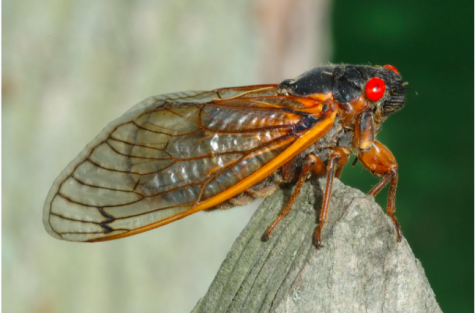Prepare for Insect-geddon: 2004’s cicadas are about to wake up
April 6, 2021

It was the spring of 2004, same-sex marriage was legalized for the first time in Massachusetts, John Kerry and George W. Bush were gearing up for the election, and an apocalyptic invasion of insects was underway.
These insects, known commonly as “periodical cicadas,” belonged to a specific swarm called Brood X. This brood spent the spring and early summer of 2004 plaguing a large portion of the east coast and mid-Atlantic. Although not dangerous, their sheer quantity terrorized Falls Church City and surrounding communities, leaving squished carcasses on walkways and bodily fluids plastered against windshields, before they eventually died and their offspring burrowed into the ground to live quietly for the next 17 years.
Now, 17 years after the last appearance of Brood X, the COVID-19 pandemic appears to be the only apocalyptic plague on people’s minds. Memories of 2004’s Cicada Spring are now all but forgotten. But as we plan for a spring and summer full of “outdoor socially-distanced gatherings,” the ground is beginning to warm, and the long-forgotten insects are clawing towards the surface, ready to provide a rude awakening.
Many of us, informed of the incoming assault or not, don’t know what to expect. While most of our parents and teachers experienced the terror of Brood X, most Mason students weren’t even born yet, and those who were were far too young to be conscious of a swarm of superbugs. So to make sure everyone is going into insect-geddon informed, this is a list of things you should know before May:
- Northern Virginia is an epicenter of the Brood, meaning that this area will get more cicadas this spring than most places.
- Cicadas will emerge with as many as 1.5 million cicadas per acre. That is approximately 1,980,000 cicadas on the Mason football field alone.
- Wildlife will go crazy as they gorge themselves on the free buffet, so expect a loud alarm clock every morning from hungry birds.
- Periodical cicadas are known for their earsplitting sound, which is produced by the males of the species to attract females. The chorus of cicadas can reach 90 to 100 decibels, which is as loud as a lawnmower from three feet away and louder than a low-flying plane.
- They’re really big, measuring about 1 to 2 inches long with a wingspan of 3 to 4 inches.
- They’ll be here a while, as they are expected to appear in late April and leave in mid-July.
- Surfaces will be littered with their exoskeletons.
- Your dogs will try to eat cicadas on walks — make sure they do not. Not only are their sharp bodies a choking hazard but if pesticides were used in your area the pesticide won’t kill the cicadas, but can kill a dog that eats the cicada.
- Male cicadas die after they mate and female cicadas die after they lay their eggs. The rotting corpses will begin to smell so it is recommended to collect the bodies and bury them in a deep hole.
- Be careful under trees, cicadas urinate off of tree branches. Their urine is by no means dangerous but if you aren’t interested in insect urine in your hair you may want to wear a hat.
- Don’t do yard work during mid-day. Cicadas sometimes confuse the vibrations of power tools with the vibrations of the males and may swarm to you if you’re using loud tools. If you have to do yard work, try and schedule it for dawn or dusk when they are less active.
If you aren’t planning on locking yourself indoors for the impending doomsday, you may be interested in downloading Cicada Safari. The app helps researchers map Brood X for scientific study. When you see cicadas, you can snap a picture in the app that will automatically report to Mount Saint Joseph University in Cincinnati for a team of students to map.








